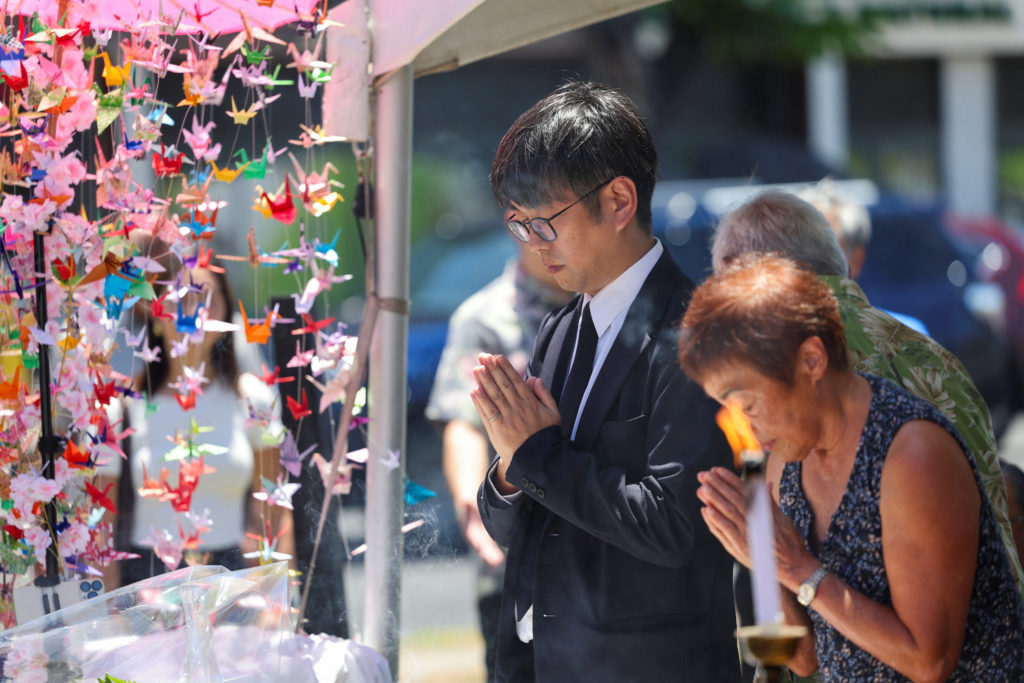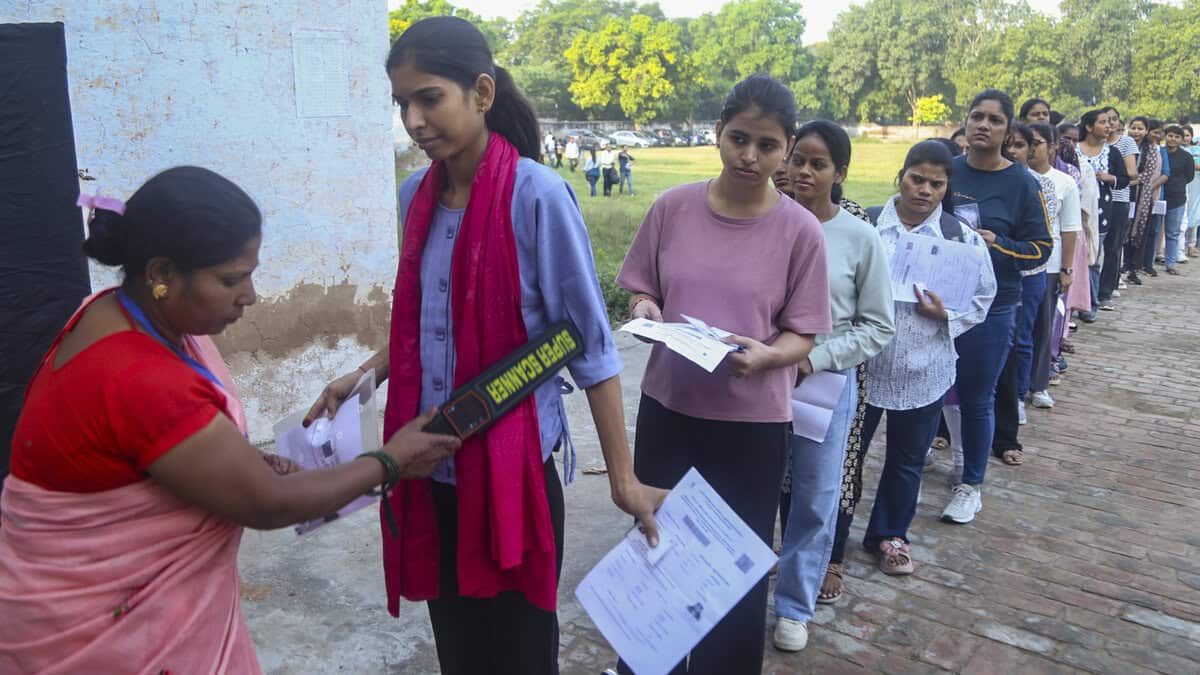

HIROSHIMA, Japan (AP) — Hiroshima on Wednesday marked the 80th anniversary of the U.S. atomic bombing of the western Japanese city, with many aging survivors expressing frustration about the growing support of global leaders for nuclear weapons as a deterrence.
With the number of survivors rapidly declining and their average age now exceeding 86, the anniversary is considered the last milestone event for many of them.
“There will be nobody left to pass on this sad and painful experience in 10 years or 20 years,” Minoru Suzuto, a 94-year-old survivor, said after he kneeled down to pray at the cenotaph. “That’s why I want to share (my story) as much as I can.”
READ MORE: As Hiroshima’s 80th anniversary nears, Japan’s royal couple honor A-bomb victims
The bombing of Hiroshima on Aug. 6, 1945, destroyed the city and killed 140,000 people. A second bomb dropped three days later on Nagasaki killed 70,000. Japan surrendered on Aug. 15, ending World War II and Japan’s nearly half-century of aggression in Asia.
Mayor says world should have learned from tragedy
Hiroshima Mayor Kazumi Matsui warned against a growing acceptance of military buildups and of using nuclear weapons for national security during Russia’s war in Ukraine and conflicts in the Mideast, with the United States and Russia possessing most of the world’s nuclear warheads.
“These developments flagrantly disregard the lessons the international community should have learned from the tragedies of history,” he said. “They threaten to topple the peacebuilding frameworks so many have worked so hard to construct.”
He urged younger generations to recognize that such “misguided policies” could cause “utterly inhumane” consequences for their future.
“We don’t have much time left, while we face a greater nuclear threat than ever,” said Nihon Hidankyo, a Japanese grassroots organization of survivors that won the Nobel Peace Prize last year for its pursuit of nuclear abolishment.
“Our biggest challenge now is to change, even just a little, nuclear weapons states that give us the cold shoulder,” the organization said in its statement.
Prayers, tributes and hope
About 55,000 people, including representatives from a record 120 countries and regions, including Russia and Belarus, attended the ceremony. A minute of silence was held while a peace bell rang out at 8:15 a.m., the time when a U.S. B-29 dropped the bomb on the city.
Japanese Prime Minister Shigeru Ishiba, the city’s mayor and other officials laid flowers at the cenotaph. Dozens of white doves, a symbol of peace, were released after the mayor’s speech.
WATCH: The intrepid journalist who exposed Hiroshima’s horror
Hours before the official ceremony, as the sun rose over Hiroshima, survivors and their families started paying tribute to the victims at the Peace Memorial Park, near the hypocenter of the nuclear blast 80 years ago.

People offer prayers during a ceremony at the Hiroshima to Honolulu Friendship Torii, a half-size replica of the gate to Hiroshima’s Itsukushima Shrine, where a bell is rung to commemorate the 80th anniversary of the atomic bombing of the Japanese city, in Honolulu, Hawaii, on Aug. 5, 2025. Photo by Marco Garcia/ Reuters
Kazuo Miyoshi, a 74-year-old retiree, came to honor his grandfather and two cousins who died in the bombing and prayed that the “mistake” will never be repeated.
“We do not need nuclear weapons,” Miyoshi said.
“There is hope,” U.N. Secretary General Antonio Guterres said in a statement read by Izumi Nakamitsu, U.N. Under-Secretary-General and High Representative for Disarmament Affairs, noting Nihon Hidankyo’s Nobel Peace Prize and countries’ re-commitment to a nuclear free world in “the Pact for the Future” adopted last year.
Guterres stressed the importance to carry forward the survivors’ testimony and message of peace and added: “Remembering the past is about protecting and building peace today and in the future.”
Near Hiroshima’s iconic Atomic Bomb Dome under high security, more than 200 protesters gathered, holding posters and flags carrying messages such as “No Nuke, Stop War” and “Free Gaza! No more genocide” while chanting slogans. Local police said two people were arrested in separate cases, each on suspicion of assaulting a security guard.
Survivors want nuclear abolishment, not deterrence
Wednesday’s anniversary comes at a time when possession of nuclear weapons for deterrence is increasingly supported by the international community, including Japan.

Pope Leo XIV holds a general audience in St. Peter’s Square, at the Vatican, on Aug. 6, 2025. Photo by Remo Casilli/ Reuters
Some survivors said they were disappointed by President Donald Trump’s recent remark justifying Washington’s attack on Iran in June by comparing it to the atomic bombing of Hiroshima and Nagasaki, and the mild response from the Japanese government.
WATCH: In Japan, young people rush to document Hiroshima survivors’ memories
“It’s ridiculous,” said Kosei Mito, a 79-year-old former high school teacher who was exposed to radiation while he was still in his mother’s womb. “I don’t think we can get rid of nuclear weapons as long as it was justified by the assailant.”
In the Vatican, Pope Leo XIV said Wednesday that he was praying for those who suffered physical, psychological and social effects from the atomic bomb on Hiroshima, adding that the event remains “a universal warning against the devastation caused by wars and, in particular, by nuclear weapons.”
Japan seeks U.S. nuclear protection
Japan’s government has rejected the survivors’ request to sign the Treaty on the Prohibition of Nuclear Weapons or attend its meetings as observers because it is under the protection of the U.S. nuclear umbrella.
Matsui, the city’s mayor, in his speech Wednesday, urged Japan’s government to sign and ratify the nuclear weapons ban treaty, a request also made by several groups of survivors in their meeting with Ishiba after the ceremony.
Ishiba, in a speech, reiterated his government’s pledge to work toward a world without nuclear weapons, but did not mention the treaty and again indicated his government’s support for nuclear weapons possession for deterrence.
At a news conference later Wednesday, Ishiba justified Japan’s reliance on U.S. nuclear deterrence, saying Japan, which follows a non-nuclear principle, is surrounded by neighbors that possess nuclear weapons. The stance, he said, does not contradict Japan’s pursuit of a nuclear-free world.

A person holds a paper lantern to release on the Motoyasu River, with the Atomic Bomb Dome in the background, in remembrance of atomic bomb victims on the 80th Atomic Bombing Day anniversary in Hiroshima on Aug. 6, 2025. Photo by Kim Kyung-Hoon/ Reuter
Past prime ministers have stressed Japan’s status as the world’s only country to have suffered nuclear attacks and have said Japan is determined to pursue peace, but survivors say it’s a hollow promise.
The Japanese government has only paid compensation to war veterans and their families, even though survivors have sought redress for civilian victims. They have also sought acknowledgment by the U.S. government of its responsibility for the civilian deaths.
Associated Press video journalist Ayaka McGill contributed to this report.
We’re not going anywhere.
Stand up for truly independent, trusted news that you can count on!
















































